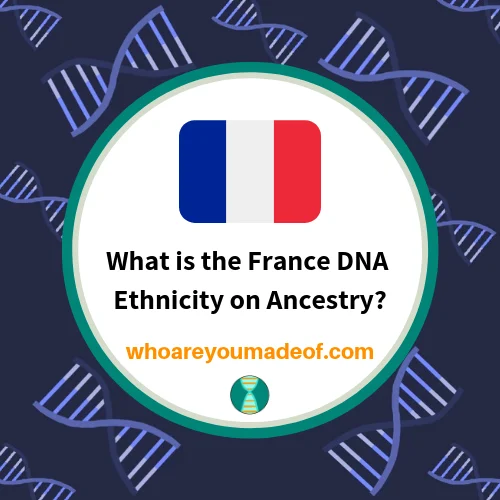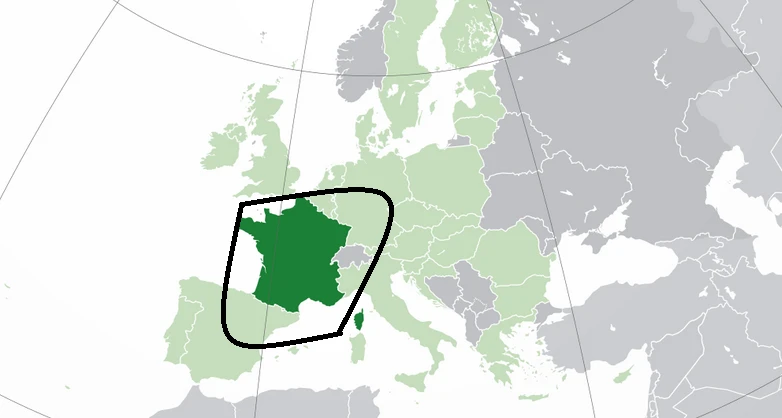Did you get the France DNA ethnicity on Ancestry? If you live in the U.S., you can count yourself as one of the more than 10.4 million Americans who have known French ancestry.

In this post, I'll explain more about this DNA ethnicity, including:
- Where the France DNA ethnicity is located
- How France got its genetic makeup
- Why there is French DNA in other parts of Europe and the world
- How to figure out how far back in your family tree you need to look to find your French ancestors
- How to start tracing your family tree back to France
Where is the France DNA Ethnicity on Ancestry located?
According to Ancestry DNA, the France DNA ethnicity region is primarily located in France (of course!), but can also be found in the following countries:
- Andorra
- Belgium
- Italy
- Luxembourg
- Monaco
- Spain
- Switzerland
For those who prefer a visual description of the general area where you are most likely to find DNA from the France DNA region on Ancestry, check out the map below:

You might notice that France DNA ethnicity covers much of the Iberian Peninsula. For those of you who had tested with Ancestry prior to the summer of 2018, you might have noticed that your Iberian Peninsula DNA was switched to the more specific "France" region due.
How did France get its genetic makeup?
If you got the France DNA ethnicity in your DNA results, it means that a portion of your DNA most closely matches a profile made up from people living in France today with extensive, verified French ancestry. However, it can be useful (and at least interesting!) to take a quick look at how "French DNA" came to be.
France has been populated by humans since the stone age, which ended about 11,000 years ago. More relevant to Ancestry DNA results is the arrival of Celtic tribes to the region about 3,000.
These Celtic peoples are the genetic foundation of most of Western Europe, including France.
Because the France DNA region is not isolated from other parts of Europe and is easily accessed by land and water, outside groups eventually gathered enough strength to defeat the formidable Celts. This is how the Romans ended up ruling what is now France for more than 500 years.
Finally, the Frankish Empire (with Germanic Europe roots) rose to power. This occurred around 486 AD, and lasted until 768 AD when Charlemagne came to power. Coincidentally, the Frankish Empire left more than just a genetic legacy: the name France is literally "the land of the Franks".
Additional contributors to the DNA of France and surrounding areas include the Vikings, who brought Scandinavian ancestry.
Why is there France DNA in other parts of Europe and the world?
If you don't have known recent French ancestry, how did you inherit French DNA? While I can't answer this question specific to your own individual family tree, the following ideas may help you decide how to approach your research.
French DNA in other parts of Europe
As most of you probably know, Europe has a complicated history. Shifting borders and political alliances have made determining where a family line truly came from a difficult exercise. Making matters more complicated is the close geographic proximity of France to other countries.
This means that if you have known ancestry from a region that borders the France DNA region, such as Portugal, Germany, or the Netherlands, for example, it might mean that you have distant ancestry originally from France in those lines.
French DNA outside of Europe
Ah, European colonization. Many people with recent ancestry in North America, Africa, South America, and Asia might be able to trace their French roots to French colonies.
A major goal of the French colonial empire was "Mission civilisatrice", or the spread of the French culture, language and religion.
Along with the increase in French political and military power around the globe came the introduction of French DNA to countries that were formerly (or currently) under French control.
This means that if you have ancestry in a country (or part of a country) that was formerly part of the French colonial empire, you might consider that you inherited your French DNA from distant French ancestors who settled in those regions.
How far back in your family tree are your France DNA ancestors?
How much French DNA did you inherit? 5%? 25%/ 85%? Can the amount of French DNA that showed up on your ethnicity estimate help you determine how far back you should look in your family tree to find ancestors born in France?
There is a general rule of thumb that can help us estimate how far back we should look in our heritage to find a "100%" ancestor of a particular background. I'll explain a little about this method, but then I will tell you why you should ignore it.
How French DNA is inherited (and DNA from any other region, for that matter)
Many people suggest that if you have 5% DNA from France, for example, you might assume that one of your parents had 10%, and a grandparent had 20%, and a great-grandparent had 40%. Using this method, you could assume that your 100% French ancestor was a great-great-great grandparent.
It's true that your DNA could have been inherited in a manner similar to the example above (i.e. halving by 50% each generation). In most cases, however, DNA is passed down more randomly.
This is because we inherit a randomly selected 50% of each of our parent's DNA.
This means that if you have 5% France DNA on Ancestry, you might have inherited all 5% of your dad's 5% France DNA. Alternatively, your dad could have had 20% and only passed down 5% to you.
Depending on how much French DNA your dad has, any number of scenarios are possible.
Additional thoughts to consider on how you may have inherited DNA from France:
- Is it possible that both of your parents have French DNA? You could have inherited a certain amount from both of them.
- We can have multiple lines of a family tree contributing French DNA. For example, if you have family with Spanish ancestry and French Canadian ancestors, you might have inherited small amounts from both lines.
Is it possible to trace your French DNA?
If you really want to know exactly who your French ancestors are, or might have been, the first thing that you should do is start building a family tree. With some patience and dedication, you really might be able to trace your tree back to France.
The Catholic Church has done an excellent job over the centuries preserving records, and these are a great source of documentation for those of us who would like to learn about our French ancestry.
I recommend building a family tree on Ancestry. It is actually really easy to get started and it's totally free to build a tree.
If you want to use the amazing collection of records on the site, you will need to have a subscription. There are additional benefits of having a subscription if you tested your DNA with Ancestry, too, so it's a win-win.
Conclusion
I hope that this post has helped you understand more about the France DNA ethnicity on Ancestry. If you have any questions about something that you read in this post, or if you would like to share your own experience discovering the France DNA ethnicity in your DNA, please join me in the discussion below.
Thanks for being here today!


Cody Alan Cunningham
Wednesday 4th of October 2023
Cody Alan Cunningham <codycunni Good afternoon,
My name is Cody Alan Cunningham and I was born in Medford, Oregon. I am 37 years old and I have quite an interesting life/journey I would like to share. If this message could reach the European Journal of Human Genetics, or someone on the staff that could verify these findings.
I was raised thinking Bret Alan Cunningham was my father. When I was 13 my mother Pam told me that Bret may not be my father. I did not find out for sure he was not my father until we used 23 and me then my results showed I had a step-sister within the past few years. That is how I knew we shared the same father. My actual father is Robert Edmund Abro of Medford, Oregon and his father Michael S Abro was a genius, his accolades are amazing. Michael worked with President Obama and even finalized the ObamaCare plan. Based on my results from 23 and me it shows I have a direct Y DNA (Paternal lineage) to King Louis the 16th of France. While researching more about King Louis XVI I came across Wikipedia and it says that he had no male children. That alone turned my head, as a historian I think it would be awesome to change history. Also, both my mother's and my father's DNA go all the way back as far as we can tell at a time frame of 275,000 years paternally and 180,000 maternally. Both the odds for each parent are less than 1 out of 100 odds, so the combination of the two, in my opinion, are astounding. Based on my research, my DNA goes directly paternally through the historical characters in the Bible.
I am not sure how accurate, or in-depth 23 and me actually is, but I would love to speak to someone personally, that really understands genes, DNA etc. I just this year dove into DNA, how it works, and how it functions. I am fascinated and would love to know more. Is this information of relevance, or is it more normal than I feel? I wish I had known all this much earlier, as I have always been far ahead in the areas of math and science.
I reside in Russellville, AR with my wife and 4 kids. Locally, things are very bad here. This year, politics has had both my wife and I lose amazing jobs, I had my own company. We have been targeted and the politicians here do nothing to top it, almost encouraging it. We do desire to relocate as a family ASAP. I just found out some of this information today and I thought my DNA might be rare, or worth studying. I would be very happy to learn more about who I am and where I came from. I have been lied to a lot growing up and have had to learn so much the "hard way".
Please let me know if this information interests anyone?
Best regards, Cody Alan Cunningham
vicky
Tuesday 7th of March 2023
Hi there. Nice page! Can you do Greek-South Italian ? (it is the same DNA, though not exactly the same with Aegean DNA, its rather from South Greece- Peloponese
Patrick Gilmore
Saturday 10th of December 2022
I am trying to locate my birth father from 1953, he was a soldier in the French army served in Vietnam from the early 50’s. Do not know much about him, my birth mother passed way 2.5 years ago, I do not know where or how to begin the search because it was so long ago, would like to know before I pass on, I am 69 years old and currently resides in the USA.
Mathilde
Sunday 25th of December 2022
@Patrick Gilmore, Hi Patrick - if you know your father's name, you should be able to look him up on the French registry (Etat Civil): https://francearchives.fr/fr/map/b2b076144a3c4392a34b14bb5e364c95
Knowing where he was born would help narrow it down. Hopefully his name is not a common one.
Another good link: https://www.guide-genealogie.com/guide/etat_civil.html
Good luck!
Diana
Friday 19th of August 2022
I have 25% France on my ancestry chart. However when I First got my results, France wasn’t even one of them. Now I know my close relatives do not come from France. They’ve come from Lithuania, Switzerland, Italy, Poland, Russia and possibly Germany. That’s as far back as I’ve been able to trace which only goes back to my great great grandparents. i read above Switzerland and Germany boarder the French portions of the DNA regions? So it’s possible the French DNA is my Switzerland dna, but the ancestors who settled there previously had come from France?
What is the Spain Ethnicity Region on Ancestry DNA? - Who are You Made Of?
Thursday 24th of September 2020
[…] DNA regions include Portugal, France, Basque, and Northern […]